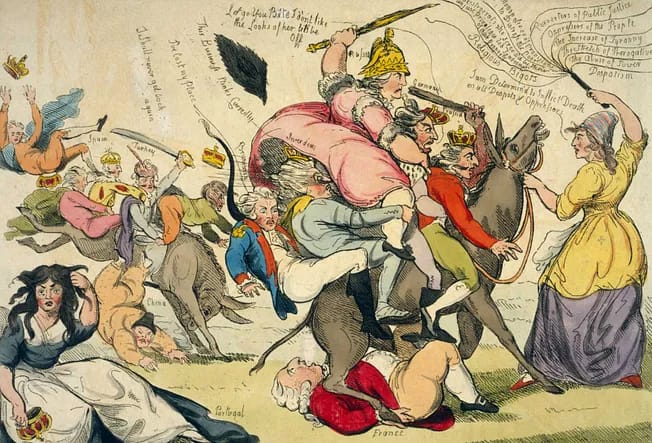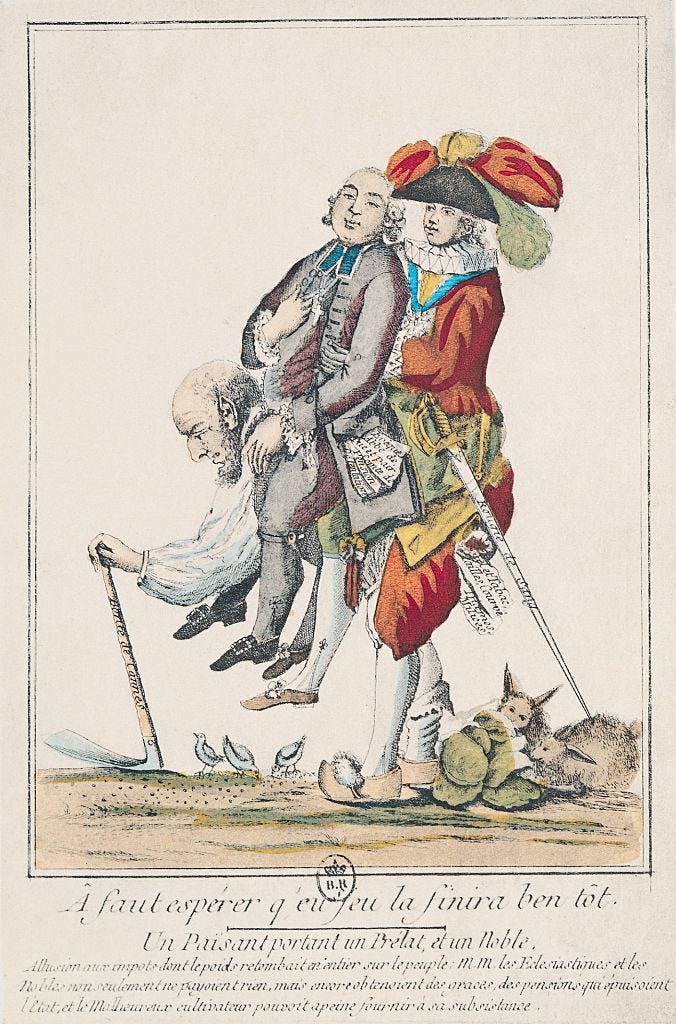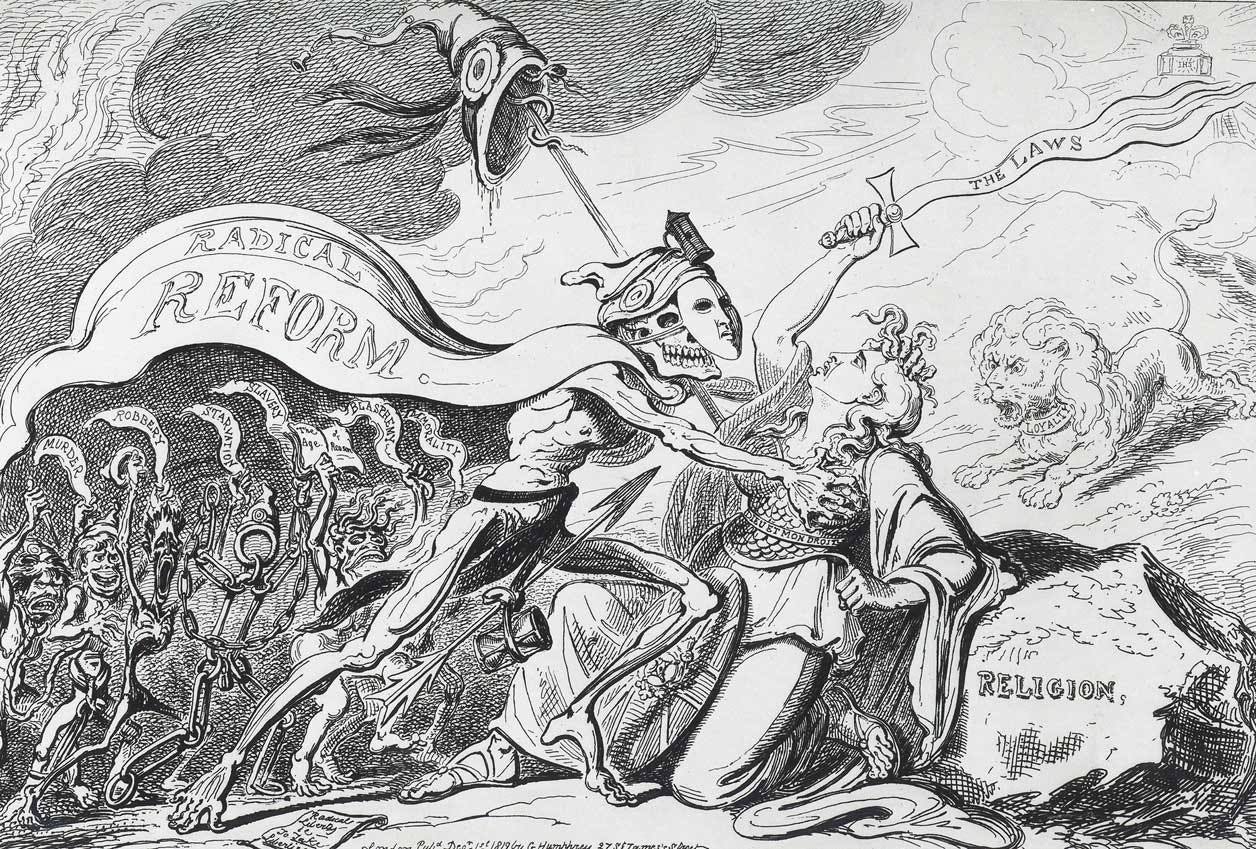
Martin Gurri, May 21, 2024
In the great global battle for power, the elites are losing. Why? Martin Gurri explains.
A fierce political conflict is raging over much of the democratic world. On one side we find the normies : ordinary people who defend, naively, the historic principles of democracy such as freedom of speech and assembly, the separation of powers, etc. On the other side stand the elites, masters of the great institutions of wealth, knowledge, and power, who insist that extraordinary measures must be taken to save a depraved and self-destructive society from its own history and its own people—that is to say, from the normies.
The elites are driven entirely by the impulse to control. They detest democracy, which keeps getting in their way, and much prefer a golden ideal they possessively call “Our Democracy”—their own rule in perpetuity. Individual rights are unfortunate legacies from a simpler era. The First Amendment, for example, they see as “hamstringing the government in significant ways.” By the way, that was Ketanji Brown Jackson talking, a Supreme Court justice whose job it is to defend the Constitution. Freedom of speech does hamstring government, that’s perfectly true—but only to the elites (who hate the sound of normie voices) is it a bad thing.
What is the conflict about?
The normies want to get on with life. They want to work, get married, have children—boring stuff. That’s what normal means.
The elites, for their part, wish to change everything: sex, the climate, our history, your automobile, your diet, even the straws with which you slurp your smoothie. For them there is no good and evil, no right and wrong, only oppressors and oppressed. Every transaction demands their intervention to protect designated oppressed groups. “Social justice” translates neatly into “elite control.”
The normies, by their very nature a disorganized crowd, fight back by pouring into the streets in frighteningly large numbers and electing politicians loathed by the elites, like Donald Trump in the U.S. and Javier Milei in Argentina. The elites, as creatures of hierarchy, are hyper-organized, and can summon to their side the established political parties, the national and transnational bureaucracies, and the activist class. They can get you from above (with government mandates) or from below (with the sloganeering mob) and would seem, therefore, to have all the advantages. Yet the conflict rolls on around the world, undecided, and it’s the elites, it seems to me, who have that frightened, desperate look.
The Jew as a Stand-In for the Normies
On October 7, 2023, the Islamist terror group Hamas burst out of its lair in Gaza and began murdering Israeli civilians. The atrocities perpetrated are well known, in part because the murderers boasted of them online. Before the Israelis could fire a shot in response, they were accused by all right-thinking elites of genocide. And not just Israelis—all “Zionists” were guilty of this crime. And not just Zionists but that scapegoat of history, the Jew, who now stood for the white oppressor and colonizer, the capitalist exploiter, ultimate avatar and expression of all that is deformed in normie society.
In Britain, attacks against Jews skyrocketed to record levels , many of them occurring within the privileged precincts of the universities. As Jews endured public abuse and harassment, the police made it clear they were not in business to protect them. In one infamous incident during an anti-Israel protest, a London police officer threatened to arrest a man for being “quite openly Jewish” and thus causing “a breach of the peace,” even as the mob shouted “Scum!” at the offender. A tarp was hastily thrown over London’s memorial to the Holocaust, to obliterate a monstrous memory and no doubt prevent another breach of the peace.
In France, “antisemitic acts” have “exploded” since October 7, according to the interior minister. Prestige universities like Sciences Po have been “occupied” by angry students demanding an end to the “genocide” in Gaza. Jean-Luc Mélenchon, leader of the country’s extreme left, has refused to qualify the murder of over 1,000 Israeli men, women, and children as a “terrorist” act. For Mélenchon, the massacre was simply payback: “violence,” he affirmed, “begets violence.”
While Europe has a venerable tradition of persecuting Jews, the frenzy reached fever pitch here in the United States: when it comes to the war on normies, we set the tone for the rest of the world. At elite universities like Columbia and Harvard, Jewish students were mobbed , assaulted, and told to “go back to Poland.” The throngs of chanting and posturing zealots on campus made for an intimidating environment: in one poll , more than 50 percent of Jewish university students said they felt “scared” for their safety. Nor was this an irrational attitude. A leading voice at Columbia’s “Gaza Solidarity Encampment”—personal pronouns: “he/she/they”— boasted online that “I fight to kill” then observed, “Zionists don’t deserve to live.”
If a similar statement had been made about blacks or gays, the whole panoply of institutional power, from the White House and the media on down, would scream its rage from the rooftops until the rest of us went deaf. But we are talking about the Jews. As in Britain and France, actual antisemitic violence has reached record levels in our country. For the denizens of our institutions, however, that is at worst collateral damage—and for many, it’s a successful experiment in establishing control.
Who are the protesters—and in what sense can they be said to reflect elite opinion? The majority are young herd animals, morally neutered to repeat whatever slogans are fed to them by their generational commissars. Like every decadent class, our elites value leadership and courage much less than conformity. As for the activists, they know little and care less about Palestine or Israel. They belong to the “anti-capitalist” progressive left, which provides the ideological lever with which the elites hope to move the world, and they fully expect that, after being schooled in righteous protest, they will ascend to the positions of power that their parents currently inhabit. Those arrested during the protests later demanded “amnesty,” so their future careers will not be damaged.
There’s an unbearable lightness to these people, but their hatred of traditional society may be accepted as sincere. The Jew, the eternal Other, they take to be the foulest product of that society: a super-capitalist and hyper-normie. He must be put in his place. Anyone with a sense of history can only wonder how many times before this tawdry script has played out.
The Silence of the Normies
The elite dream is to turn the clock back to the day before the internet was invented. Short of that, they wish to turn the web into something like the front page of The New York Times circa 1960. To this end, the Biden administration has engaged in surreptitious schemes to censor social media, most of which have been discovered—see the Twitter Files —and are now being challenged in court. The European Union, a happy coven of elites who don’t have to contend with the First Amendment, has been more successful in deploying privacy and antitrust concerns, along with the usual panic over “disinformation,” to limit what the typical user in Europe can access.
In the race to create a vast silence of the normies and call it democracy, a new contender, Brazil, has suddenly leapfrogged to the head of the pack. That country’s socialist president, who, like Cher, goes by a single name, Lula, believes that his opponents on the populist right thrive only because of lies on social media—and that the latter must be suppressed for the good of all. Accordingly, he has created a “Secretariat for Digital Policies” and appointed a “National Prosecutor for the Defense of Democracy,” whose job it is to bring criminal action against online content that the government finds distasteful.
In Brazil, it is now against the law to tell “intentional lies” that harm “public policy.” What can such vague language mean? Evidently, only Lula knows.

A French peasant bears the weight of a clergyman and a nobleman in 1789. (Photo by Art Images via Getty Images)
But the leader of Brazil’s “speech harms democracy” movement isn’t Lula but a Supreme Court judge, Alexandre de Moraes. Because of his position, de Moraes enjoys near-arbitrary power over every aspect of digital content, and he has wielded that power with abandon, throwing speech offenders in prison without trial , for example. He has blocked from social media hundreds of elected officials and political commentators he has deemed guilty of violating truth as he perceives it and endangering democracy as he interprets it. There is no appeal, and the decisions are often concealed from the public.
All those punished are conservative and populist critics of the current government. For the elites, everywhere and always, democracy is legitimate only when under their firm control: there can be little doubt that de Moraes, who is chief judge of the country’s election court, considers it his duty to ensure that the rule of the virtuous is maintained indefinitely.
Digital platforms that fail to bend to these novel standards of accepted speech are summarily penalized. In March 2022, de Moraes suspended the messaging app Telegram for failing to freeze accounts the judge found to be infected with disinformation. Telegram surrendered. In January 2023, however, he fined the app over $230,000 for hosting supporters of the defeated populist president, Jair Bolsonaro.
Brazilian elites share their American counterparts’ revulsion for Elon Musk’s discussion platform, X (formerly known as Twitter). In a Brazilian version of the Twitter Files, Substack journalist Michael Shellenberger has revealed that de Moraes intervened constantly to block populist voices seeking refuge on X. Musk reacted by calling for the judge to be impeached, while de Moraes, who maintains Musk is running a for-profit disinformation campaign, has now opened a criminal investigation on the billionaire.
The quarrel between two narcissistic personalities is low on information but high in entertainment value. For an honest verdict on the matter, I suggest we turn to Shellenberger , who is himself under investigation by Lula’s government for making public the facts of its behavior:
The real extremist spreading disinformation here is de Moraes. If Musk were solely motivated by money, then he would not have stood up to de Moraes, which resulted in the Brazilian government halting all advertising on X, the resignation of X’s top lawyer in Brazil, who feared for his safety, and may result in de Moraes shutting down X in Brazil.
The ‘Far Right’ as a Criminal Offense
Elites require control over the information sphere because their policy obsessions—on immigration, gender, and climate, for example—are not popular with the normies. By necessity, progressive fantasies must be imposed on our mediated reality, even as dissenting opinions are cast out into the dark. The internal combustion engine will destroy the earth; windmills will save it. Trump is a wannabe dictator; Biden, the adult in the room. Antagonists are always “far right”; there’s no such thing as “far left.” The ambition to conquer the empirical world with words approaches magical thinking.
It rarely works. The chaos and contingencies of the digital age allow the normies and their chosen tribunes, the populists, too much room to maneuver. Trump’s rise in the opinion polls would otherwise be inexplicable.
At the moment, a specter haunts the finest minds of Europe: in the June 9 elections for the European Parliament, the “far right” could well emerge as the largest voting bloc. This would be a tectonic shift in the politics of the continent. Many of the parties involved, like Marine Le Pen’s National Rally in France, have been treated as pariahs, untouchable by establishment politicians of all stripes. A right-wing victory on June 9 could earn Le Pen what the elites have stubbornly denied her: legitimacy. Consequences follow. As The Guardian fretted , “Will Europe set the stage for President Le Pen?”
Against this fraught background, a gaggle of “national conservatives” met in Brussels at a conference sponsored by something called the Edmund Burke Foundation. Included among the participants were Hungarian prime minister Viktor Orbán, French presidential candidate Éric Zemmour, and Brexit promoter Nigel Farage—all heartily detested by the elite left but all familiar, even stodgy, figures in the European landscape.
Intimidation from local politicians made it difficult to find a venue, as possible sites backed out under pressure. Once the conference at last began, Brussels police arrived in large numbers and banned the proceedings , claiming a threat to the public order. Dazed attendees were forced to scamper into the street. “Thank God for Brexit,” an irate Farage remarked , gazing at the barricades erected by the police to ensure the conference did not resume.
The raid was ordered by Brussels mayor Emir Kir, an elected official from the righteous left. No reason was given as to why the conference had been considered a danger to public safety. The pretext was flimsy, and the spectacle wouldn’t have looked out of place in Cuba or China. Criticism from Europe’s heads of government was muted and lacking in conviction.
The European Union guarantees “the right to freedom of peaceful assembly”—but apparently not to everyone, or in every place. Kir made the point bluntly: “The far right is not welcome,” he said. Despite—or maybe because of—their growing popularity in the polls, national conservatives, like the Jews, had become living breachers of the peace.
The Revolt of the Normies and the Confidence Crisis of the Elites
The nature of the global conflict is interpreted very differently by the normies and the elites. The normies believe that digital platforms have brought them into close proximity to the people at the top of the pyramid. They can criticize—loudly and rudely—presidents, journalists, and experts of every kind as equals in the information sphere. They can talk back. Increasingly, they have risen in revolt against these elites and their institutions, which they find self-serving and inept.
Those of you who follow my ramblings know that I believe this to be the most fruitful way to look at the conflict.
The elites disagree. They find it far-fetched to think that the public is growing feistier or more independent: the exact opposite is the case. The normies are viewed by the elites as a “ basket of deplorables ,” a dull and almost animalistic mass of cravings that are easily manipulated by clever but unscrupulous populists. Fake news on social media hypnotizes the online multitudes and leads them to perdition. How else to explain their surly attitude toward their betters? What other reason could there be for the millions who voted for Trump?

Britannia in danger of violation from the great political libertine in 1819. (Photo by Universal History Archive via Getty Images)
This interpretation has a calming effect on the elites, restoring their faith in the way the world is supposed to work. The conflict, properly understood, isn’t between lowly nobodies and themselves at all. It’s between good (institutional) elites and evil (populist) ones who manipulate the masses. Either way, the elites are always in charge, as God intended.
The interpretation also contains a ready-made strategy. Social media, of course, must be “regulated.” That goes without saying. But more importantly, populism must be criminalized. The manipulators must be removed by force from the political scene. If, in the name of democracy, the full might of the institutions, particularly the courts, can be unleashed against these demagogues, the normies will lapse into their usual mindless apathy and the long secular struggle will be won.
That’s the program Lula is implementing in Brazil. That’s what Kir did in Brussels. And that’s what President Biden is attempting to do with his nemesis, Trump.
To a neutral observer, Trump’s current trial in New York appears as almost a parody of politicization. The crime he stands accused of is, to put it mildly, obscure. It was allegedly committed in 2016 but the indictment wasn’t unveiled until the 2023 election season—and the trial date was rushed forward so it could be held before the elections. The evidence pertains more to public relations than criminal justice. Trump has been forbidden from leaving New York, placing his campaign in a deep freeze. He has been hit with a gag order, preventing him from making his case before the public. One doesn’t have to be a MAGA fanatic to see this as an exercise in personal and political destruction. It will probably work—if not this time, then the next.
What then? Suppose Trump is convicted of a felony and somehow disqualified from running for the presidency. What follows?
If the normie interpretation is right, and Trump is merely a club in the hands of an angry public, the backlash will be ferocious. Electorally, whoever the Republicans choose to replace Trump will crush Biden on Election Day. Republican majorities in Congress are also likely, and they will arrive from the borderland eager to punish the institutions at the center. The next former president facing criminal prosecution, in that case, will surely be Biden.
The global chieftains of the elite class—Biden, France’s Macron, Germany’s Scholz—are massively unpopular with voters, even their voters. Elected populists like India’s Modi, Hungary’s Orbán, and Italy’s Meloni, on the other hand, are riding high. Around the world, there’s an extraordinarily large number of elections scheduled for this year. An earthquake is coming: the political landscape could well be unrecognizable by 2025.
The elites have been accused of cluelessness, but they have a keen instinct for survival. They can sense impending disaster: the aggressive moralizing, the embrace of a bizarre ideology, the trampling on the norms, all of it is a function of panic. The twenty-first century presents a riddle they have so far been unable to solve. As a class, they own all the big guns and command the strategic heights, yet their prestige has evaporated, and power is slipping like water through their hands.

Martin Gurri is a former CIA analyst and the author of the book The Revolt of the Public. Read his piece “ Trump. Again. The Question Is Why? ” and follow him on X @mgurri. This piece has been reprinted with permission from Discourse.
